Trial and tribulation
Accused cop seeks solicitor’s advice in BBC drama


‘Showing mercy can transform us and others’

Accused cop seeks solicitor’s advice in BBC drama


‘Showing mercy can transform us and others’
The Salvation Army is a Christian church and registered charity seeking to share the good news of Jesus and nurture committed followers of him. We also serve people without discrimination, care for creation and seek justice and reconciliation. We offer practical support and services in more than 700 centres throughout the UK. Go to salvationarmy.org.uk/find-a-church to find your nearest centre.
The Salvation Army first published a newspaper called the War Cry in London in December 1879, and we have continued to appear every week since then. Our name refers to our battle for people’s hearts and souls as we promote the positive impact of the Christian faith and The Salvation Army’s fight for greater social justice.

Editor: Andrew Stone, Major
Deputy Editor: Philip Halcrow
Assistant Editor: Sarah Olowofoyeku
Staff Writer: Emily Bright
Staff Writer: Claire Brine
Editorial Assistant: Linda McTurk
Graphic Designer: Mark Knight
Graphic Designer: Natalie Adkins
Email: warcry@salvationarmy.org.uk
The Salvation Army United Kingdom and Ireland Territory 1 Champion Park London
SE5 8FJ
Tel: 0845 634 0101
Subscriptions: 01933 445445 (option 1, option 1) or email: subscriptions@satcol.org
Founder: William Booth
General: Lyndon Buckingham
Territorial leaders: Commissioners Jenine and Paul Main
Editor-in-Chief: Major Julian Watchorn

Drawing up a bucket list is not an unusual practice for people nearing retirement. However, that list of things still to achieve in life does not usually include race walking 100 miles, non-stop, in under 24 hours or travelling to the Sahara desert to complete a marathon every day.
Yet those were activities Ian Richards wanted to tick off the list once he reached 60. In the 16 years since then, Ian has gone on to compete in race walking competitions around the world. As we discover in this week’s War Cry, he won two gold medals at the World Masters Athletics Championships in Sweden this summer – 44 years after he competed in the Moscow Olympics in 1980.
‘It’s funny, because I’m part of a group of athletes who always look forward to getting older,’ Ian tells us. ‘There are a lot of world records to be broken when you’re in your 90s or over 100.’
The joy he finds in taking part in international competitions is important for Ian but that is not all that he experiences as he competes.
‘When I walk, I feel God’s presence,’ he says.
Christians believe that we can all enter into a relationship with God and receive his forgiveness for the things we have done wrong in the past. Then God’s mercy and love will shape and influence every area of our lives, not just the time that we would spend in church.
This week author Natalie Williams tells us about a book she has written that explores how, once God’s mercy has been received, sharing it with others can transform a person’s life.
‘Mercy affects what we do with our money and what we do with our possessions,’ she says. ‘If we take seriously Jesus’ invitation to be mercy-bringers, it will radically transform us. I don’t think anyone around us would be the same either.’
With such an opportunity to make a change for good, perhaps more of us should be adding ‘show more mercy’ to our own bucket lists.






TV preview: Showtrial Sundays BBC1 and iPlayer
By Claire Brine
Time is running out. The planet is being destroyed. And a group of activists, known as Stop Climate Genocide, are pushing for urgent action in the new series of the BBC1 drama Showtrial
As protestors clash with police outside the offices of a processed food company in Brighton, journalist Felix Owusu (Fisayo Akinade) is reporting live.
He catches on camera the heartfelt speech made by the Stop Climate Genocide founder, Marcus Calderwood (Barney Fishwick), and the moment that the police arrest him and lead him away.
Six months later, Marcus is cycling down a quiet country lane when a car knocks him off his bike. After removing Marcus’s cycle helmet and loading his bike into the car, the driver flees the scene, leaving Marcus unconscious in a roadside ditch.
By the time paramedics reach Marcus, he’s fighting for his life. Though he can barely talk, he blurts outs that he knows who crashed into him. ‘It was a police officer,’ he says.
Later, news reports confirm that Marcus has died due to injuries sustained in a hit and run. Stop Climate Genocide protestors demand answers as to who
killed him. But the police have no answers to give. Tracking down their prime suspect, PC Justin Mitchell (Michael Socha), is proving a struggle.
Believing that it’s only a matter of time before he’s called in for questioning, Justin pays a visit to solicitor Sam Malik (Adeel Akhtar). He assures Sam that he’s not guilty – and asks him to defend his case if it comes to court.
Sam isn’t sure what to do. He has a reputation for ‘winning lost causes’, and he believes that Justin is entitled to a fair trial – guilty or not. But several people close to Sam see the situation from a different perspective. His son, in particular, thinks he shouldn’t take on the high-profile case, arguing that the stress of defending a murder suspect could damage his father’s already fragile mental health.
While the big decisions we face in our own life may bear no resemblance to Sam’s judicial dilemma, many of us know how it feels to go through times when decision-making feels impossible. Perhaps we worry about the future, recognising that a bad choice today could result in painful consequences for our loved ones tomorrow. Or it could be

Activist Marcus addresses protestors
that we don’t trust our own judgement, having made decisions in our past that we regret, yet cannot undo.
When life looks complicated and we don’t know what to do, there is always someone we can turn to for help. Day or night, we can talk to a God who wants what’s best for us – and he will listen. No matter how many times we approach him with our struggles, he promises to guide our future steps.
The Bible says: ‘With all your heart you must trust the Lord and not your own judgement. Always let him lead you, and he will clear the road for you to follow’ (Proverbs 3:5 and 6 Contemporary English Version).
Whatever situations we face – and however confused we may feel – God can be trusted to support and help us. Each new day, he is willing to fill us with his love and strength. No doubt about it, inviting him into our life is the best decision we can ever make.
Sporting stars give their support to a football tournament for people without a place to call home
Manchester City men’s captain and England star Kyle Walker joined former Celtic and Wales striker John Hartson to support players at The Salvation Army’s football tournament for people who are experiencing homelessness.
The 13th Partnership Trophy, held at Goals in Manchester, brought together 30 teams for the five-a-side tournament, which helps raise awareness of homelessness, boost morale and improve the wellbeing and mental health of players.
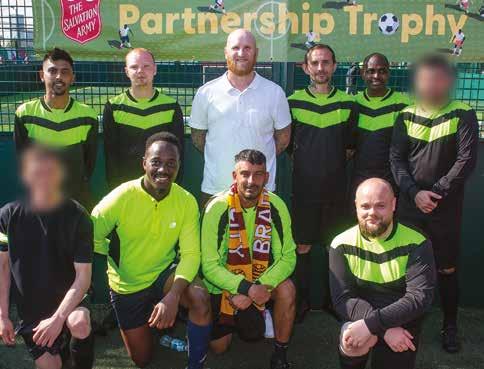

The teams were made up of people connected to Salvation Army homes and hostels – known as Lifehouses – which provide services such as supported housing, outreach programmes and dropin services around the UK.
Cheered on by friends and supporters, the players were also championed by the two special guest footballers. Kyle chatted with players about their experiences of homelessness, and John spoke to them about his career and his own struggles battling cancer and a gambling addiction. He was impressed with the players and their skills.
‘The standard of football has been great,’ he said. ‘They’ve played seven or eight games, and their fitness levels are so good! The camaraderie is great. There’s a lot of respect for each other.
‘People have been sharing their stories
with me, some who have lost their way at some stage in their life but are working really hard to get back on track.’
John also presented the trophy to the winning team, which was representing The Orchard Lifehouse in Bradford.
One of those team members was Raf. Prior to the tournament he and the other players from The Orchard had been training twice a week for a few months.
‘It wasn’t easy,’ he said. ‘There were tears, arguments, everything. But we went through all this so we didn’t make any mistakes in the tournament.’
While he was delighted to have been part of the winning team, Raf describes the whole Partnership Trophy tournament as an amazing experience. He travelled to Manchester by coach with 32 people from The Orchard, which also included other residents and day shelter service users
who went along to show their support.
‘It was a nice atmosphere, we relaxed before arriving, listened to music and talked with each other about tactics. When we arrived, we got changed and got on the pitch to warm up,’ he explained.
‘I was really excited. When we got to the finals and won the trophy, we couldn’t even express with words how happy we were.’
Several months ago, Raf’s life looked very different.
‘I was working as a bartender and someone promised me a job,’ he explained. ‘Unfortunately that job was a big lie, and that’s how I ended up with no work and no house. With no money, you won’t get any housing.’
But then, he was able to move into The Orchard and the staff there were able to help him. Throughout the country, the Salvation Army’s facilities for people
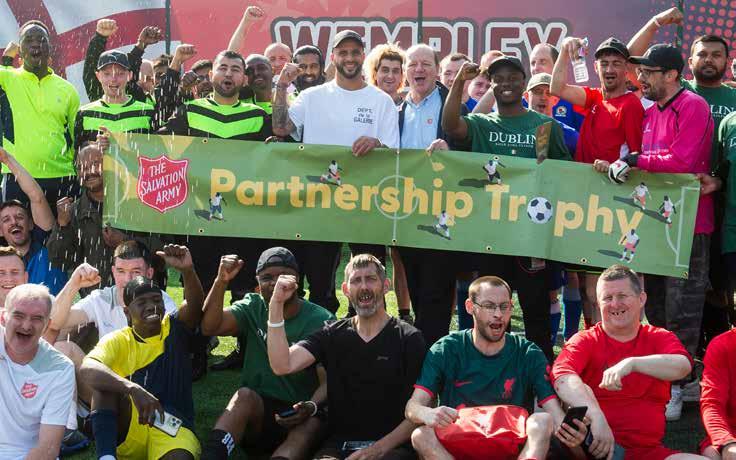

Raf receives instructions from his coach
experiencing homelessness provide support and places to live for some 3,000 people every day.
Being in the football team has made me much happier
Raf started playing football shortly after he moved into the centre in Bradford when he saw a poster on the information board and asked a staff member who told him that football took place on the pitch every Tuesday.
Being on the football team, Raf said, has made him ‘much happier’.
‘I’ve gotten more fit and have better communication with players and residents.’
He added that, since living at The Orchard, life had improved.
‘When I came here, I was stressed out. I had anger issues, alcohol issues, drug issues, and now slowly everything is settling – no alcohol, no drugs. I have the best support I’ve ever had.’
The Partnership Trophy is made up of lots of people with a similar story to Raf’s, people who have been helped by The Salvation Army’s homelessness services to turn their lives around.
‘The aim of our Partnership Trophy is to celebrate everyone within our homelessness services, acknowledging the journey they are on, and recognising the challenges that many have had to overcome,’ said Nathan Slinn, deputy director of the church and charity’s homelessness services.
He thanked John Hartson, Kyle Walker, Goals, and the Guardiola Sala Foundation,
which donated footballs and caps and covered the cost of reusable water bottles, stress balls, bags and transport for teams travelling from across the country.
The Guardiola Sala Foundation is a humanitarian charity set up by Pep Guardiola and his family, which has supported the event for the past five years. The Manchester City manager said: ‘It’s so encouraging to witness how football can bring people together and help them overcome really tough personal challenges.’
The event was also sponsored by The Salvation Army’s insurance company, Sagic, which provides comprehensive insurance products to families, business and charities across the UK, and whose profits are used to provide financial backing to many of the great causes supported by The Salvation Army.
Author NATALIE WILLIAMS reflects on the importance of showing kindness and forgiveness to others, even when it’s hard
Interview by Emily Bright
Some interviews make you more introspective than others.
And, while preparing to speak to Natalie Williams about her book on mercy, I’m left re-examining how merciful I am in my own life.
Natalie can relate. ‘As I was writing ’Tis Mercy All, things kept happening that were a real test of mercy,’ she says. ‘And most times I failed that test. I put some of my own stories in there to expose my heart, because I thought it’s better to be
open about my shortcomings.’
Writing ’Tis Mercy All – a book about God’s mercy and how showing it to others can transform lives – was a personal project for Natalie. The book opens with a radical example of mercy. Natalie explains that her friend was knocked off her bike and killed by a lorry driver. During the court case, her friend’s Christian parents asked the judge to show mercy to the man responsible for their daughter’s death.
We have an opportunity to live differently
Natalie says that the showing of such mercy stems from the example of Jesus, God’s Son, who is at the heart of the Christian faith. She draws on Scripture to illustrate how, while he was on Earth, he showed countercultural mercy countless times.
‘Jesus was willing to give his time and attention to people from all walks of life,’ she says. ‘He healed a Roman centurion’s servant. I can imagine if you were one of the Jewish people following Jesus at that time, you’d be baffled: “Jesus, that’s the enemy. What are you doing?”
‘My favourite verse in the Bible is Luke 6:36, where Jesus says: “Be merciful just as your Father is merciful.” That’s a wonderful invitation from Jesus for us to imitate the mercy we’ve been shown by our Father God. When we do that, it’ll affect all areas of our lives.’
Natalie believes that following Jesus offers us ‘an opportunity to live differently’. She says: ‘Mercy affects what we do with our money and how we feel about our possessions. In western society, we are possessive and territorial, and Jesus is asking us to be open-handed, to share our money, time, skills and power.
‘If we take seriously Jesus’ invitation to be mercy-bringers, it will radically

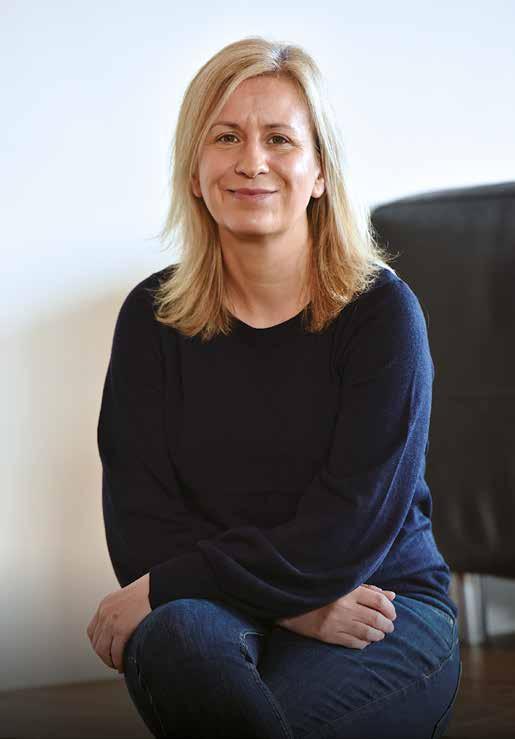

transform us. I don’t think anyone around us would be the same either. We can model something that’s beautiful to the world around us, that cannot at this point in time be found in our society.’
Our conversation turns to the cancel culture of modern society, where a misspoken word or wrongful act can be career-ending for public figures.
‘When we’re cancelling people,’ Natalie explains, ‘virtue-signalling and making sure we’re quick to rush to distance ourselves from the sinner and to make it clear we disagree, we are saying that we think we’re being more enlightened than that person who expressed that view.
‘But if any of us find ourselves on the wrong side of that, when we mess up or make a mistake, we immediately

find that we don’t want to be cancelled. What we want in that instance is mercy and forgiveness. We want to know that redemption is possible.’
Natalie believes that, in order to model the mercy that we want to be shown, there needs to be ‘more space for nuance and more understanding of the complexity of human nature’. She thinks that this broader view will create ‘more space for compassion to grow in our hearts’.
‘Jesus is calling us to want the good of others,’ she adds, ‘no matter how bad we think they are.’
She is also aware that she has often been the recipient of God’s mercy throughout her life.
‘I’ve made some big mistakes,’ she admits. ‘I’ve backslidden, I’ve fallen away,
I’ve had times where I’ve been lukewarm towards faith. I became a Christian at 15. Then, when I was 19, I went off the rails for a season.
‘I’ve seen God’s mercy in that it feels like he has pursued me everywhere I’ve gone. He has always come after me – and in the words of Psalm 23 – his goodness and mercy follow me all the days of my life.’
Natalie’s understanding of mercy has been amplified through adversity. Her life as a Christian has never been straightforward.
‘My belief in the complete mercy of God has been forged in fire,’ she says.
Turn to page 8 f

From page 7
God has been forged in fire,’ she says. ‘I’ve gone through a lot of stuff that I’ve found incredibly painful, often feeling alone in it. Each time I’ve emerged from the wilderness, I seem to have grasped something more of the mercy of God.’
I wonder how she reconciles the mercy of God with all the pain present in the world – a question commonly posed by those grappling with faith. Natalie makes it clear that God doesn’t approve of suffering.
‘God is anti-sick, he is anti-death, he is anti-pain and suffering and sickness, and yet we live in this complexity where these things happen,’ she says. ‘We know that God is able to stop such suffering and doesn’t in this period of time where we have free will.’
Yet Natalie believes that, in the midst of suffering, God is ever-present, offering help to all those who ask for it. She returns to the Bible to illustrate her point.
‘When you do a deep dive into the
Scriptures for the mercy of God, you suddenly see it everywhere. The stereotype of the Old Testament is that God is angry and vengeful. But what you find throughout the Bible is that any time anyone cries out to God for help, he responds.
‘Mercy is so woven through the pages of Scripture, and it’s amazing to me that people aren’t talking about it more.’
Look at how Jesus
As Natalie speaks, it’s with a powerful authenticity – she knows what it is to live out her faith through the toughest of times.
‘I’ve lost people,’ she reflects. ‘At the age of three, my brother died. The impact of that on me and my family has been absolutely massive.
‘Yet I’m now able to say: “Okay God,
I don’t understand it. But I do choose at this point to believe that somehow your mercy was at work – even in that tragedy – because I see your character, and I’ve seen your mercy in everything.”
‘All I would say to anyone who is suffering, Christian or non-Christian, is to really read the Gospels.
‘Look at how Jesus treats people, at his compassion, at how he treats the grieving, the sick and the broken-hearted.
‘The more time you spend looking at Jesus, the more beautiful you’ll find him. And the more you’ll start to find his mercy at work, even in your own suffering.’


l ’Tis Mercy All is published by SPCK
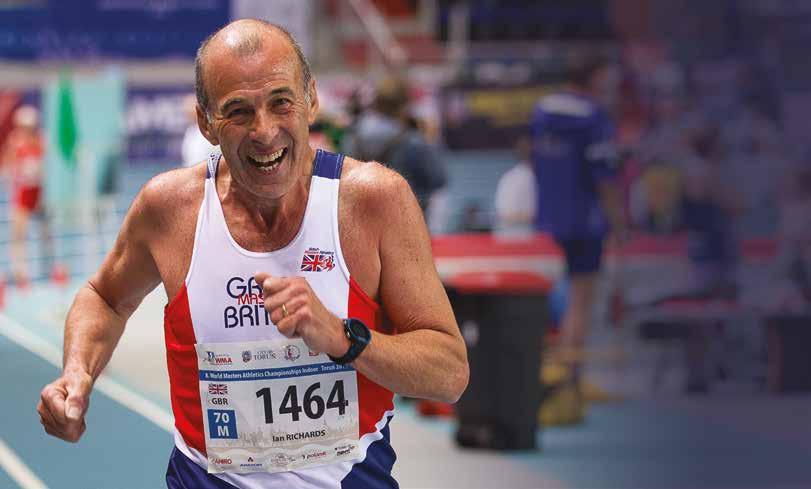
Silver Sunday tomorrow (6 October) is an annual event run by Age UK when people from across the generations hold free fun activities for older people. Ahead of the day, 76-year-old athlete IAN RICHARDS talks about the joy of competitive race walking – and why he thinks the human body is God’s greatest creation
Interview by Claire Brine
While some people dream of taking it easy in their retirement, 76-year-old Ian Richards from Worthing has no interest in slowing down. Over the summer, he won two gold medals for race walking in the 5,000m and the 10km at the World Masters Athletics Championships in Sweden.
‘I finished the 5,000m in just over 30 minutes, and the 10km in about 61 minutes,’ says Ian, a regular competitor in the M75 category, which is made up of male athletes between the ages of 75 and 79. ‘It’s funny, because I’m part of a group of athletes who always look forwards to getting older. There are a lot of world records to be broken when you’re in your 90s or over 100.’
Since retiring from work at the age of 60, Ian has won 10 world championship gold medals in his age category for race walking and currently holds six world records. But his interest in the sport began back in the 1960s, when he was a young man working for a pensions company in London.
‘I was useless at sport at school,’ Ian explains. ‘My best achievement was coming third in a wheelbarrow race. But when I started work, I discovered race walking. Every year, my colleagues would enter this seven-mile walking race around the City, so I thought I’d join them. It sounded like fun.
‘Much to my surprise, I did quite well. So I kept entering the race over the years, and then one day someone suggested that I join a walking club. I didn’t even know that they existed. But I was introduced to a club, which happened to include two Olympic gold medallists. So there I was, a complete novice, getting advice from these great athletes.’
Over the next few years, Ian made great strides in the sport of race walking. He wondered if he had what it took to be an international competitor.
‘I decided to spend 12 months giving it everything I’d got, just to see if I could make it,’ he says. ‘By the next year, in 1978, I was selected to represent Great Britain at the European championships
in Prague. I came last – but that was the motivation I needed to improve.’
Supported by his wife, Elaine, and two young children, Ian continued to train while maintaining a full-time job. Two years later, in 1980, he was on his way to the Olympics in Moscow.
‘My event was the 50km race walk –and it was such an exciting event to be part of,’ he reflects. ‘I remember thinking to myself: I’m going to walk into that Olympic stadium and cross that finish line, come what may.
‘When I got to the end of the race, entering the stadium was pure magic. I felt exhausted, but the cheering followed me around the track. It was very emotional.’
Out of about 30 starters, only 15 athletes in the 50km race made it across the finish line. Ian – with a ‘best’ walking pace around 8mph – came in 11th place.
‘In retrospect, I could have done better,’
Turn to page 10 f
he says. ‘It was a hot day and I walked a lot slower than my best times. But I’d achieved a dream. I was an Olympian.’
Two years later, Ian retired from race walking, having decided that it was time to focus his energy on his family. In his spare time, he took up adventure sports and enjoyed working with children as a scout leader. He also started attending The Salvation Army.
‘In 1984, my father-in-law died, and Elaine said that she wanted to mark her first Christmas without him by going to church,’ Ian explains. ‘We lived in Maidenhead back then, and our children had a loose connection to The Salvation Army’s Sunday school – so that’s where we went. I was surprised that I enjoyed it. We kept going back.
‘I started to see that people at The Salvation Army were so content with life –and I didn’t understand it. I had a perfect family, a good job and a nice house, but I didn’t feel as fulfilled as they did. Eventually, I came to recognise that they were happy because they knew Jesus. And that’s when I decided to give my life to Jesus too.’
At The Salvation Army, Ian felt as though he’d found his spiritual home. He
After retiring at the age of 60, Ian completed the Marathon des Sables
started to help with the church’s youth work. Life was good. But two years later, a phone call at work brought devastating news for him.
‘Elaine had collapsed with a massive brain haemorrhage, and she died in hospital,’ he says. ‘I was in my 30s, left with two young children. But the support I received from people at the Army was wonderful. God made himself known to me through their kindness. Yes, I was grieving, but I couldn’t have been in a better place.’
I thought my sporting days were behind me – but they weren’t
Despite the pain of his loss, Ian continued to find fulfilment in his faith. He decided to take a course in fire-eating, and used his newfound skill to preach the gospel during open-air evangelistic meetings. He also started helping at Salvation Army events across the UK, such as children’s camps and sport weeks, where young people could have


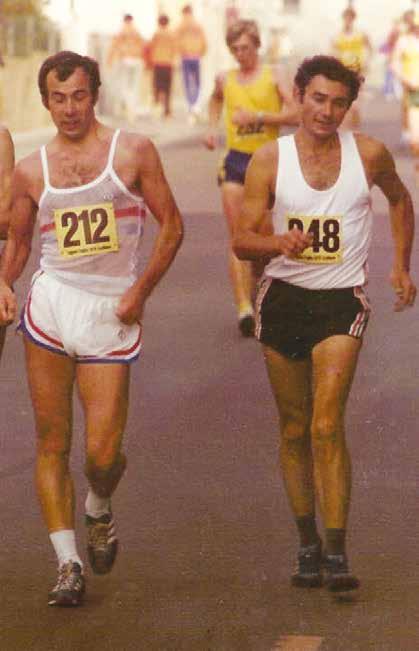

Ian used fire eating to preach a gospel message
fun while also learning about God.
‘I had thought that my sporting days were behind me – but they weren’t,’ Ian says. ‘God continued to bless me. One of the biggest blessings around that time was meeting Barbara, who became my second wife.’
Years later, as Ian approached retirement, he started to think about his bucket list and the activities he wanted

On his way to getting a gold medal at the World Masters Championships in the 10km race walk in Malaga, 2018
to tick off. So, at the age of 60, he undertook the centurion challenge, walking 100 miles, non-stop, in under 24 hours. The next year, he travelled to the Sahara desert for the Marathon des Sables, a week-long event in which he completed a marathon every day.
‘Asa result of all the training, I thought I’d get back into competing,’ Ian says. ‘So I entered the European Masters Athletics Championships, which are open to athletes over 35. My first race was in Hungary, in 2010, and I won a gold medal for the 5,000m. I’ve been competing ever since.’
It was through a recent championship that Ian formed a connection with the European Space Agency – and became classified as one of the world’s super agers.
‘The agency became interested in
me and other older athletes because our levels of fitness mean that we are managing the ageing process well,’ Ian explains. ‘Currently, astronauts who undertake long space flights age rapidly, so scientists are tracking people like me to see what happens to our bodies year by year. Even though I’m 76, I’m told that my physical age is 59.’
Having never let his age hold him back from achieving his goals, Ian is keen to encourage other older people to keep moving and enjoy life. Taking part in sport, he says, is not just good for a person’s physical and mental health but also their spiritual health.
‘In the film Chariots of Fire, the Olympic sprinter Eric Liddell says that when he runs, he feels God’s pleasure. But for me, when I walk, I feel God’s presence,’ Ian says.
‘Whatever a person’s age, the human body is a fantastic piece of machinery created by God. Its capabilities are amazing. The Bible tells us that we are fearfully and wonderfully made – and we need to be thankful for that.’
The War Cry invites readers to send in requests for prayer, including the first names of individuals and details of their circumstances, for publication. Send your Prayerlink requests to warcry@salvationarmy.org.uk or to War Cry, 1 Champion Park, London SE5 8FJ. Mark your correspondence ‘Confidential’.
There is no set formula to becoming a Christian, but many people have found saying this prayer to be a helpful first step to a relationship with God
Lord Jesus Christ,
I am truly sorry for the things I have done wrong in my life. Please forgive me. I now turn from everything that I know is wrong.
Thank you that you died on the cross for me so that I could be forgiven and set free.
Thank you that you offer me forgiveness and the gift of your Holy Spirit. Please come into my life by your Holy Spirit to be with me for ever.
Thank you, Lord Jesus. Amen

Eating fruit and vegetables is good for us – and, according to the Bible, a healthy inner life also includes fruit. In this series Peter Mylechreest takes his pick of nine life-enhancing qualities called ‘the fruit of the Spirit’
Mrs Hayler, an elderly widow, had been confined to bed for some years when a minister from the Salvation Army church went to visit her. Somehow the widow radiated joy. The minister wondered whether it was an act to reassure him that she was managing. But when he privately asked her carer, Jan, about Mrs Hayler’s disposition, he was told that she was always like that. When he enquired why, Jan said: ‘I think it is her faith in God.’
Early Christian teachers, whose words are recorded in the Bible, said that when Christians encountered difficult times, they should greet those challenges with joy! That does not sound sensible. However, those teachers were talking about the fruit of God’s Spirit in the life of a believer.
The joy they spoke about reaches beyond the normal response to hardships. It can exist because the whole experience of having God’s Spirit in a Christian’s life develops their ability to endure, building character and giving a hope that never disappoints.
This sort of joy is not merely a comfy feeling or a superficial happiness. Instead, it is a deep-seated awareness that absolutely nothing can separate Christians from the love, care and presence of God.
Such joy can’t be worked up or manufactured, and it is independent of outward circumstances. It is not dependent on accomplishing a particular goal or winning some prize. Its foundation is in a God who interacts with people, and it is an undeniable sign of the presence of his Spirit with them.

A Christian who is temporarily depressed and not feeling particularly joyful should not be discouraged. God is still with them. Fruit grows and ripens over time.
And because of different temperaments, true joy may be experienced in a variety of ways – ranging from elation to quiet satisfaction as shown by people such as the bedridden Mrs Hayler.
Joy is good to grow.

To receive basic reading about Christianity and information about The Salvation Army, complete this coupon and send it to
Cry
Or email your name and postal address to warcry@salvationarmy.org.uk


Manga, a style of comic books and graphic novels, originated in which country?
Which comedy film released this year starred Mark Wahlberg and Halle Berry as a couple involved in a spy mission?
Who had a No 1 hit last year with her single ‘Flowers’?
West End musical Six is based on the story of which king’s wives?
What car was given the nickname Tin Lizzie?
Which Roman emperor built the 73 mile-long frontier wall across Britain in AD122?

Feature
by Sarah Olowofoyeku
‘If you can read this, thank a teacher’, so the mug slogan says. And today (Saturday 5 October), Unesco – the United Nations Educational, Scientific and Cultural Organisation – is showing its appreciation for all educators with World Teachers’ Day.
This year in particular, Unesco wants to ensure that the voices of teachers are heard, and that their challenges are addressed. The main event of this year’s celebrations is a global gathering ahead of the day itself at Unesco’s headquarters in Paris, when teachers from around the world will be able to have their say – virtually or in-person – on the issues affecting them.
Unesco also wants to use World Teachers’ Day to highlight the need for a new social contract for education, underlining the importance of valuing the knowledge, voice and participation of teachers in decisionmaking processes in education. At a time when it believes the value of the teaching profession is in decline, and when there is a global shortage of teachers, Unesco wants to make improvements.
Its aim is to boost the teaching profession again – recognising teachers as community developers, and equipping them to become agents of change.
Teachers have been a force for change in many people’s lives. As we grow older we recall the teaching we’ve had in our past, and we can see the way certain lessons influence the decisions that we make today.
Lots of people consider Jesus to be the greatest teacher to have lived. He taught thousands, instilling values that have shaped our culture today – lessons on how to love, forgive and be at peace with others.
But, most importantly, Jesus taught people how to know God. The way to do that wasn’t simply by following his teachings; it was by following him.
Jesus taught: ‘Anyone who has seen me has seen the Father’ (John 14:9 New International Version). He invited people not just to listen to what he said, but to commit their lives to him and to know God, his Father, through him.
The invitation is open to all to learn that through Jesus we can have a relationship with God – which is surely the most valuable lesson of all.
ACROSS
1. Fundamental (5)
5. Humorist (5)
8. Haul (5)
9. Stage play (5) 10. Extemporise (2-3) 11. Opponent (5)
12. One of a pair (4)
15. Hug (6)
17. Infection (5) 18. Supplicated (6)
Yell (4) 25. Suffer (5) 26. Apply force (5)
Presses (5)
Animal organs (5)
Mature (5) 30. Not now (5)
1. Spending plan (6) 2. Fried prawns (6) 3. Allure (5) 4. Slice (5) 5. Envious (7) 6. Slaughtered (6) 7. Partial refund (6)


Armed conflict (3)



Offer (3)
Hint (3)
Depressed (3)
Deer meat (7)
Mollycoddle (6)


300g tomatoes
1tbsp vegetable oil
200g white onions, peeled and roughly chopped
500g chicken thighs, diced
2 garlic cloves, peeled and finely chopped
1tsp ground cumin
1tsp ground turmeric
1tsp ground cinnamon
2tbsp tomato purée
200g carrots, peeled and roughly chopped
15g chicken bouillon powder, dissolved in 200ml hot water
400ml water
400g can chickpeas, drained
50g dried apricots, roughly chopped
20g fresh flat-leaf parsley, finely chopped
Salt
Preheat the oven to 170C/Gas Mark 4.
Cut the tomatoes in half and place them cut-side down on a lined baking tray in the oven for 30 minutes, until softened and the skins have lifted from the flesh. Remove the tomatoes from the oven and pinch off all the skins.






Place a pan over a high heat. When hot, add the oil followed by the onions. Sauté for 10 minutes, until the onions begin to soften. Add in the chicken pieces, garlic, cumin, turmeric, cinnamon and tomato purée. Cook for a further 5 minutes. Add the skinned roasted tomatoes, then the carrots and stir well. Add the dissolved chicken bouillon along with the 400ml water and chickpeas. Stir well.
Leave to simmer for 20-30 minutes, until the carrots have started to soften, the tomatoes have started to break down and the chicken is cooked through.
Stir in the parsley and dried apricots.
Season with salt, to taste, before serving.

